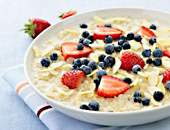- MENU
- HOME
- SEARCH
- WORLD
- MAIN
- AFRICA
- ASIA
- BALKANS
- EUROPE
- LATIN AMERICA
- MIDDLE EAST
- United Kingdom
- United States
- Argentina
- Australia
- Austria
- Benelux
- Brazil
- Canada
- China
- France
- Germany
- Greece
- Hungary
- India
- Indonesia
- Ireland
- Israel
- Italy
- Japan
- Korea
- Mexico
- New Zealand
- Pakistan
- Philippines
- Poland
- Russia
- South Africa
- Spain
- Taiwan
- Turkey
- USA
- BUSINESS
- WEALTH
- STOCKS
- TECH
- HEALTH
- LIFESTYLE
- ENTERTAINMENT
- SPORTS
- RSS
- iHaveNet.com: Health
Susan C. Male, R.D.

So, did Mom know best when she told you to eat your breakfast? Of course she did.
Turns out numerous studies have shown that breakfast isn't just good for your brain; it can help you lose weight too. Researchers surmise that's because eating breakfast helps keep you full longer, reduces cravings and curbs overeating.
But what kind of breakfast is best for weight loss?
A Bigger Breakfast Is Not Better
A few years ago, research from Virginia Commonwealth University found that a big (610-calorie) breakfast that's high in protein and complex carbohydrates can help maintain and even encourage weight loss. However, a new German study counters with findings that suggest that big breakfasts are not magically slimming; in fact, more calories simply make you fatter, not fitter.
In this study, researchers at Else-Kroner-Fresenius Center of Nutritional Medicine in Munich followed 380 people and found that when people ate more at the start of the day, their bodies did not compensate by curbing intake at subsequent meals. Instead, their bodies essentially "forgot" that they had overeaten at breakfast and continued to eat the same amount of calories at lunch and dinner, resulting in an even bigger total calorie count at the end of the day.
Skipping Meals Is Not the Answer
Does this mean you should skip breakfast if you want to lose weight? No, says Marsha Hudnall, a registered dietitian and program director of Green Mountain at Fox Run in Vermont, a non-diet, healthy weight-loss spa exclusively for women. "This study definitely does not suggest that skipping breakfast is a wise move," she says. "It just suggests that large breakfasts don't help us eat less and may well end up increasing our calorie intake for the day."
Eat Better, Not Bigger
The key to healthy eating and weight loss, therefore, is not a big breakfast or no breakfast, but a better breakfast. "Weight management is much more than a matter of calories in versus calories out," says Hudnall. "The nutritional quality of what we eat, as well as our attitudes and emotions about food, all have a huge impact."
A typical breakfast contains about 1/4 of your daily calories. But more important than the size of your breakfast are the foods you choose. To that end, Hudnall suggests the following:
- Strive for a balance of healthy proteins, fats and carbs. Smart choices include: eggs, nuts, nut butters, yogurt, fruits, vegetables, and whole-grain breads and cereals, including oatmeal.
- Eat whole fruits instead of juices for the most staying power.
- Smoothies made from yogurt, fruits and nuts can provide a balanced meal in a drink. (Just be aware that calories in smoothies add up quickly.)
- Steer clear of traditional junky breakfast foods, like donuts, sweet rolls, pancakes, and sausage and bacon, all of which are high in fat and calories and low in nutrients.
- Go easy on added sweeteners in coffee or tea.
So the next time you're tempted to grab a cup of coffee and go, think again. The best breakfast provides bulk, not calories -- filling you up, not out.
Susan C. Male is a registered dietitian and freelance nutrition and health writer. She is the co-author of Foods for Better Health and the former editor of the Environmental Nutrition newsletter. Male has also written articles for Family Circle, Redbook, Child and American Health.
Available at Amazon.com:
Last Child in the Woods: Saving Our Children From Nature-Deficit Disorder
Copyright © All rights reserved.
AGING | ALTERNATIVE | AILMENTS | DRUGS | FITNESS | GENETICS | CHILDREN'S | MEN'S | WOMEN'S
Health - The Best Breakfast for Weight Loss